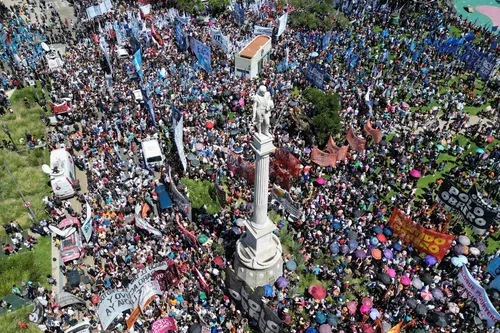
While the streets are filled with protesters against the fiscal adjustment mega-decree, the courts receive cases asking for its annulment and parliamentarians are working together to reject it, President Javier Milei threatens to call a plebiscite to try to obtain population support for the measures he announced, a direct democracy strategy that could prove useless in this case, since the Constitution provides that only Congress can call a binding popular consultation, that is, whose decision would have to be compulsorily accepted.
More than a dozen legal appeals have already been filed to try to block the implementation of fiscal adjustment measures. One of the most relevant is from the Province of Buenos Aires, which demands the absolute nullity of Decree of Necessity and Urgency (DNU) 70/23, due to unconstitutionality, and that precautionary protection be ordered, immediately suspending the effects of the mega-decree.
The request is under the responsibility of the federal judge of La Plata, Alberto Recondo, who will possibly have to issue a decision before Friday, when the DNU comes into force. If he suspends the DNU, the Casa Rosada must appeal the decision, taking the case to the Federal Chamber of La Plata. In the end, the final battle must take place in the Supreme Court.
“The president’s decision to modify approximately 300 laws with multiple and heterogeneous content, something expressly prohibited by article 99 of the National Constitution, places us before a serious, unprecedented, exceptional institutional situation for one of the pillars of our Constitution: the republican form of government”, argues Guido Lorenzino, defender of the People of the Province of Buenos Aires. His appeal has weight because it represents the largest district in Argentina and 40% of the national population.
Plebiscite
This Tuesday (26), Javier Milei threatened to call a plebiscite “for the people to decide” if his will encounters social and institutional resistance. His argument: his proposal consists of “a liberating, anti-caste shock” and a “cultural change” so that Argentina “stops being sick with socialism.”
Despite the differences regarding the content of the DNU, the different opposition political camps agree on a criticism of the government: that the initiative to repeal the laws by decree turns its back on the Legislative Power. “Stop lying to people,” Milei responded about it. “(Mauricio) Macri and Cristina (Kirchner) signed many DNUs, but I can’t.”
In Casa Rosada, there is an understanding that the opposition in Congress could reach an agreement to reject the initiative, which would be a severe blow to the government. Not to mention the possibility of a legal setback, which could occur more quickly.
The Constitution provides that only Congress can call a binding referendum. Popular consultations called by the Executive Branch can only be non-binding, that is, even if the government wins, this would not be translated into concrete regulations, it would not necessarily apply. During the campaign, Milei had already proposed this same mechanism to repeal the Voluntary Termination of Pregnancy Law, which he was opposed to. At the time, several constitutionalists had already pointed out that there was this limit.
Manifestations
At the end of the morning of this Wednesday (27), the CGT (General Confederation of Labor), the largest union center in Argentina, together with the Piqueteira Unit, the Union of Workers of the Popular Economy (Utep), the Classist and Combative Current and left-wing parties, among other social, political and trade union organizations, began to occupy Lavalle Square, in front of the Palace of Courts, in the center of Buenos Aires, to express their repudiation of Milei’s decree.
With the slogan “Down with the DNU”, the concentration was called by the CGT with the aim of giving more weight to its judicial representation, as well as others that have already been presented — more than a dozen — with the aim of stopping the reach of the presidential decree.
Faced with the expected massive mobilization, the government threatens to use the same resources already used last week during the first street protests against Milei: anti-blocking of roads protocol, excessive police operation and withdrawal of citizens’ rights. According to the Presidency spokesperson, Manuel Adorni, “all deterrence measures” devised by the Executive will be implemented.
Asked about the right to demonstrate, which contradicted Security Minister Patricia Bullrich’s protocol, Milei said: “In 16 days of government, there will already be three marches. Can’t they accept that they lost? Society chose something else, let someone else govern with other ideas, with another vision of the world”.
With information from Página 12 and La Nación.
Editing: Rodrigo Durão Coelho
Source: www.brasildefato.com.br

